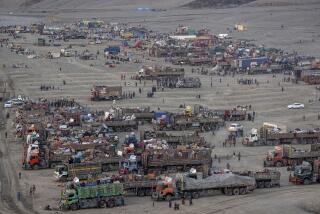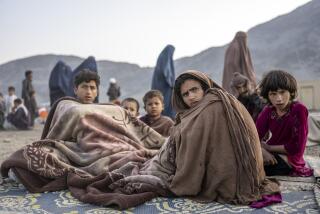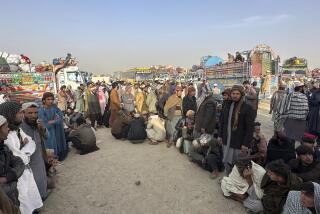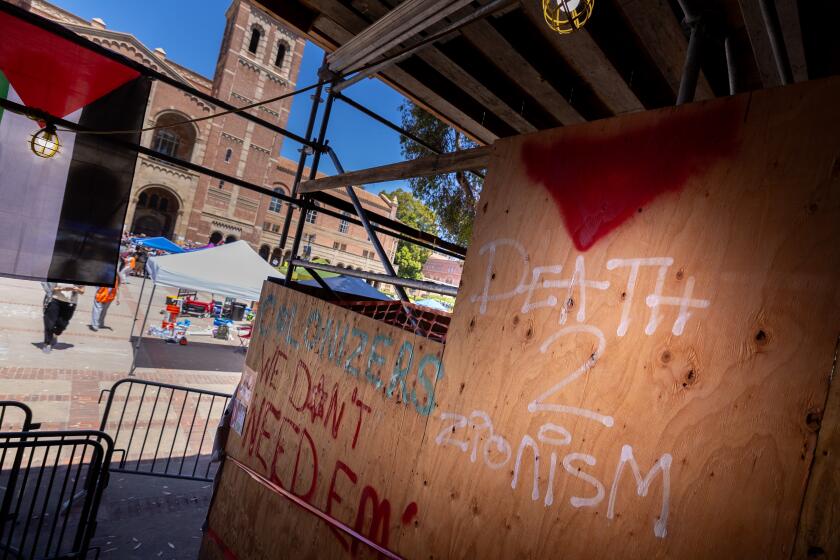Al Qaeda Routed, Militias Claim, but No Bin Laden
Tribal militiamen wearing sneakers and sandals overran the Al Qaeda terrorists’ last bastion in Afghanistan on Sunday after two weeks of fierce fighting but found no trace of Osama bin Laden, commanders said.
The ragtag but battle-seasoned militias launched their final assault after morning prayers that celebrated the end of Ramadan, the Muslim holy month, storming the mountain redoubt in a two-pronged attack that their leaders said sent the remnants of Bin Laden’s personal army fleeing toward the snow-covered peaks overlooking Pakistan, two miles away.
For the record:
12:00 a.m. Dec. 20, 2001 FOR THE RECORD
Los Angeles Times Thursday December 20, 2001 Home Edition Part A Part A Page 2 A2 Desk 1 inches; 30 words Type of Material: Correction
Gunships--A report from Afghanistan in Section A on Monday incorrectly stated that Apache and Black Hawk helicopters were strafing the Tora Bora region with howitzers. Those aircraft are armed with other weaponry.
“This is Al Qaeda’s last day,” Haji Mohammed Zaman, a senior commander, told reporters two miles from the front. “We have captured the area and the caves.”
Appearing on NBC-TV’s “Meet the Press,” Secretary of State Colin L. Powell said, “We’ve destroyed Al Qaeda in Afghanistan, and we have ended the role of Afghanistan as a haven for terrorist activity.”
But making a surprise visit to an air base north of the Afghan capital, Kabul, as part of a six-day tour of the region and Europe, Defense Secretary Donald H. Rumsfeld voiced skepticism about whether the Al Qaeda forces at Tora Bora had been entirely routed. The fighting had grown less fierce, he said, but was far from over.
“The Taliban is not running the country at the moment, but there still are Al Qaeda and Taliban people in the country, in the mountains, hiding in between and in the caves,” he said.
No one, however, claimed to know the whereabouts of Bin Laden, whom the United States accuses of masterminding the Sept. 11 attacks on New York and the Pentagon and for whom it has offered a $25-million bounty.
“He was here a few days ago, but I have no information on him now,” said another commander, Hazrat Ali. Intelligence agents were said to have intercepted radio messages from him last week in the Tora Bora region.
“We’ve received nothing that is discouraging, but we continue to receive mixed messages,” Rumsfeld said.
If the Afghan commanders’ claim of victory proves correct--and they have been guilty of exaggerations and deceptions in the past--the destruction of Afghanistan’s Taliban government and the Al Qaeda terrorists it hosted will have come with stunning speed. Only 34 days will have separated the fall of the Al Qaeda stronghold in the capital and the collapse of the terror network’s last one at Tora Bora, a mountain complex of caves that the Soviet Union tried to capture in the 1980s but never did.
Zaman said that about 300 Al Qaeda soldiers, both Afghans and foreigners, had been killed in a weekend of fighting and devastating U.S. bombing. Twenty-two others were taken prisoner, he said, while 500 more, having left behind heavy weapons and ammunition, were trekking through dense forests toward Pakistan, where the government has sent 4,000 commandos to the border to block their passage.
“Is this a victory?” Ali asked rhetorically. “Yes. But it doesn’t mean we have peace yet.”
In addition to the terrorists who slipped out of Tora Bora, peace is threatened by other Al Qaeda holdouts in the Shindand district of west Afghanistan; in Helmand province, northwest of the southern city of Kandahar; and in the vicinity of Kandahar itself.
Many are religiously fanatic Arabs, Chechens and Pakistanis who are looked upon as outlaws by their own countries and are essentially homeless now that the Taliban has fallen and Afghanistan no longer wants them. They have shown little regard for the life of others and a willingness to fight to the death.
The United States almost certainly will push ahead with its hunt for escaped Al Qaeda fighters and will continue its search for Bin Laden. Observers speculated that Bin Laden could be in Pakistan, in the forests with his band of protectors or even still hiding in one of Tora Bora’s caves. Wherever he is, assuming he is still alive, he is a man on the run, his ability to command and control severely restricted, a liability to any host or government that dares to offer him sanctuary.
The three commanders who fought Bin Laden’s die-hard forces in the White Mountains around Tora Bora claimed to have made major advances Saturday with the help of about 300 U.S. and British commandos and heavy U.S. airstrikes on Al Qaeda positions. The region has long been described as impenetrable, especially in winter, when bitter cold and snow make it all but uninhabitable.
Sunday morning, heavy clouds and near-freezing temperatures hung over the barren, parched, stone-studded Tora Bora landscape, which looks like a set designed for “Lord of the Rings.” The new moon, marking the 10th month of the Islamic calendar and the end of Ramadan, had been sighted the night before, and militiamen wrapped in brown blankets prayed in mud-walled mosques before preparing for the final assault. None had flak jackets or helmets, few had winter clothes, and only a handful had more than three clips of ammunition.
Sultan Ali, a 20-year-old fighter, shivered as he put on a wool jacket found in an Al Qaeda cave a few days earlier. He picked up his Kalashnikov rifle and strapped a bandoleer around his chest. He tilted his head and adjusted his turban at an angle that pleased him.
Was he afraid?
“No,” he said. “Not at all. I have always been fighting. What is there to be scared of? I have never known a comfortable day in my life.”
Commander Zaman came up the mountain trail in his Toyota pickup and gave a small army of waiting reporters and television cameramen a thumbs-up sign. Overhead, invisible above the layer of clouds, U.S. warplanes, including at least one B-52 bomber, circled. Without warning, coal-black plumes of smoke billowed from the line of ridges where Al Qaeda was making its stand.
Rumsfeld said an Afghan source, whom he did not name, had told him that 200 Al Qaeda members were killed in Tora Bora on Sunday and 11 captured, including a senior Al Qaeda commander. Nine Taliban were also captured, and there were “maybe plus or minus 2,000 trying to get away to the hills in various places,” the secretary said. He received intelligence briefings throughout the day, apparently in an area of his plane from which an aide later emerged with a box of shredded documents.
U.S. warplanes have dropped a daily rain of more than 200 bombs in recent days in the Tora Bora region. Low-flying helicopter gunships, including heavily armed Apaches and Black Hawks, have been also been blasting the area with howitzers.
Meanwhile, in southern Afghanistan, U.S. soldiers gained what looked like an intelligence bonanza recently when they seized an Al Qaeda camp called Tarnak Farms, which Rumsfeld described Sunday as particularly large and significant. Documents and other items found there will be tested for evidence that they might be linked to chemical and biological weapons and radiation, the secretary said.
The site, long on the Pentagon list of more than 25 suspected Al Qaeda havens that investigators have been systematically searching for, sits about 60 miles south of Kandahar and roughly five miles east of the recently established U.S. Marine base called Camp Rhino. The Pentagon disclosed Sunday that three Marines stationed there had been injured in a mine-clearing accident.
At Tora Bora, commander Ali had promised his men that he would get them home by Eid al-Fitr, the celebration that marks the end of Ramadan’s month of fasting. He came only close to fulfilling the promise, but for the first time since the land battle for Tora Bora began two weeks ago, his men went up the mountain with full stomachs.
During the daylight hours of Ramadan, Muslims are expected to eschew food, drink, tobacco, gum, sexual intercourse and all forms of indulgence. The prophet Muhammad, however, excused pregnant women, travelers, the sick and soldiers at war from fasting. But the militiamen on Tora Bora had observed the dawn-to-dust fast just the same.
“I could have eaten and, as a soldier, still been a good Muslim, but I didn’t,” said Sayed Razik, 33, who sold shoes before his life became consumed by war more than a decade ago. “This battle was not as difficult as some. I really didn’t need the food to feel strong and fight well.”
*
Lamb reported from Tora Bora and Hendren from Tbilisi, Georgia.
More to Read
Start your day right
Sign up for Essential California for news, features and recommendations from the L.A. Times and beyond in your inbox six days a week.
You may occasionally receive promotional content from the Los Angeles Times.






